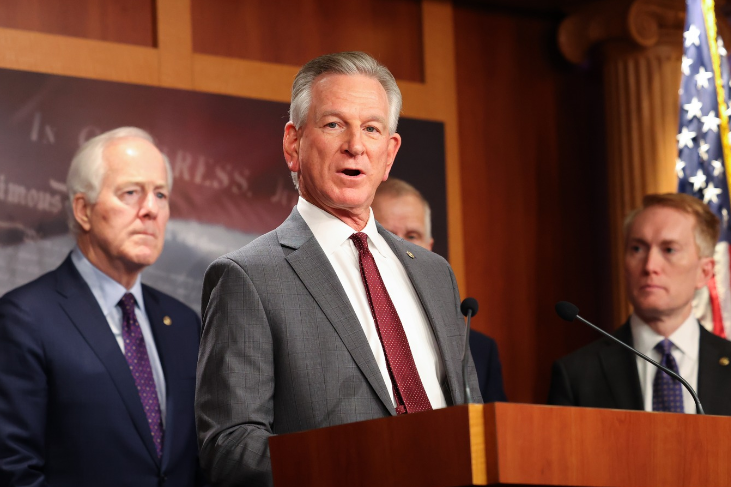Through a global pandemic, historic inflation and crippling supply-chain issues, we are seeing just how critical food security is to national security. Thankfully, America’s farmers and the agriculture industry continue to rise to the challenge, keeping our shelves stocked and ensuring families across the country can put food on the table.
Ranking second nationally in freshwater fish production, and third in poultry and peanut production, Alabama’s contributions to our national food supply are evident. That is why I promised to be a voice for Alabama’s farmers and will continue that promise throughout the new Congress. I am proud of what we’ve accomplished together the past two years, but this year is our most important yet as the Senate and House Agriculture Committees craft and pass the next Farm Bill. As a proud member of the Senate Agriculture, Nutrition, and Forestry Committee, I look forward to ensuring Alabama’s agriculture industry has a permanent seat at the table during this process.
Every five years, Congress passes a large legislative package known as the “Farm Bill.” Providing funding to agricultural and food programs, the Farm Bill offers an opportunity to prioritize the needs of those that support our national agriculture industry, including farmers, producers, and those living in rural communities. About 46 million Americans, or 14 percent of our total population, live in rural areas. In Alabama, this number is more than 40 percent, with 55 of our state’s 67 counties in the rural category.
Understanding and prioritizing the needs of those living in rural areas, who shoulder the vast responsibility of feeding, fueling, and clothing our nation, is key to creating a successful Farm Bill. This is why my team and I are meeting with farmers and producers across our state to ensure their voices are included as we draft the legislation.
Listening sessions with Alabama’s agriculture community began last fall, and this month, members of my team traveled to the state to hear viewpoints from different sectors of Alabama’s agriculture industry, including corn and soybean producers, cotton and peanut producers, cattlemen, horticulturists, and foresters. We heard how rising costs for inputs—such as fertilizer, feed, and fuel—are driving down bottom lines and cutting into producers’ margins. We also heard concerns about a reliable domestic labor force, underscoring how important the agricultural guestworker program, H-2A, is to Alabama farmers’ ability to operate their businesses and produce our nation’s food supply.
This feedback is driving my focus on four key priorities: ensuring that funds for rural development projects reach their intended destination, expanding access to broadband for rural areas, protecting our farm safety net and crop insurance, and addressing rising input costs.
Our rural communities are the backbone of our economies and we must focus on efforts that help them thrive. Money allocated through the Farm Bill must be targeted toward the real needs of our agriculture suppliers and rural communities. This legislation should remain a true “farm” bill—not a nutrition or climate bill with funding going solely toward nutrition benefits or climate change. Our job as Ag Committee members is to hold our leaders accountable, ensuring every dime allocated for rural development isn’t funneled to something else.
It's impossible to speak of rural development without mentioning broadband access. Farming is increasingly driven by technology, and it is imperative that our farmers are not left out of the latest technological advances because of their geographic location. Equipping rural communities with the latest technology will streamline productivity and increase opportunities, making it possible to live off the land again. For example, funds from the last Farm Bill allowed the U.S. Department of Agriculture to partner with local leaders in Selma, Ala. to provide technical innovation hubs in the area. This is the kind of good that can be achieved when these funds reach their intended objective.
Finally, we must address today’s agriculture issues so that they do not become tomorrow’s catastrophes. This includes addressing potential shortages of people who want to farm but can’t because the cost of doing business is so high. Farmers are struggling with rising input costs, discouraging upcoming generations from joining—and staying—in the agricultural industry. It also forces many family farms to sell their land, leading to industry consolidation while increasing the potential for an adversarial foreign buyer to purchase more American farmland, posing a risk to our national security. We can’t stand by and allow our farmers to be forced out of their livelihoods when we have the tools to tackle the problems they are facing.
I look forward to continuing to advocate for Alabama’s farmers and agriculture workers, so that they can continue supporting our nation’s food supply and thrive in their local communities.
Senator Tommy Tuberville represents Alabama in the United States Senate and is a member of the Senate Armed Services, Agriculture, Veterans’ Affairs, and HELP Committees.
Don't miss out! Subscribe to our newsletter and get our top stories every weekday morning.










